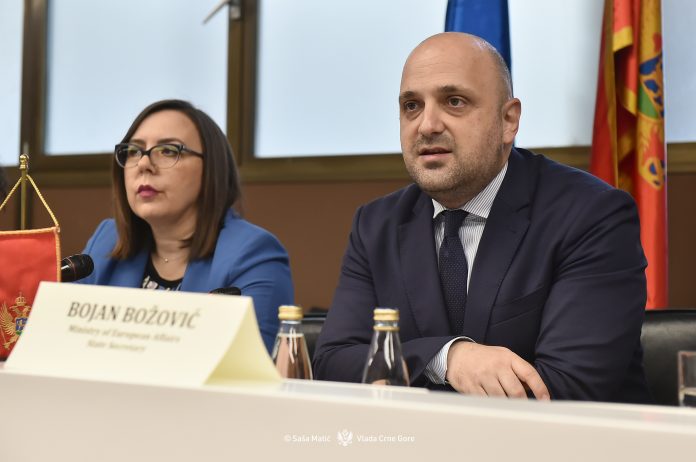“This Government has taken its task seriously and the will of the citizens to make Montenegro the next EU member state. In the recent period, we have focused on achieving concrete results in Chapters 23 and 24 to revive Montenegro’s negotiating process with the EU and have invested all capacities towards consistently implementing what we have outlined within the European agenda in terms of fulfilling the closing benchmarks in other chapters of the EU acquis,” stated Bojan Božović, State Secretary in the Ministry of European Affairs. He opened the fourteenth meeting of the Subcommittee on Innovation, Human Resources, Information Society, and Social Policy between the EU and Montenegro today
Božović expressed confidence that Montenegro has already demonstrated its capability to face the challenges on this path and is getting closer to the goal of EU membership. He reflected on the results achieved in the individual areas covered by this Subcommittee since the previous meeting.
He highlighted that in Chapters 2 (Freedom of Movement for Workers) and 19 (Social Policy and Employment), the focus was on improving the existing institutional framework and strengthening administrative capacities through amendments to existing laws and the adoption of new ones, such as the Amendments to the Law on Foreigners, Amendments to the Labor Law, and reforms of the Employment Agency of Montenegro aimed at digitizing its operations.
He reminded that in Chapter 10 (Information Society and Media), work on a set of media laws was completed, the Information Security Law was sent to the Parliament, and work continued on the Electronic Communications Law, which is in the final stage.
Božović stated that in Chapter 25 (Science and Research), intensive work is underway on the preparation of the Science and Research Strategy 2024-2028 and the Roadmap for Research Infrastructure of Montenegro 2024-2028.
Regarding Chapter 26 (Education and Culture), he noted that Montenegro, with the support of the EU Delegation and UNICEF, began the project “Quality Education for Every Child” in January, aiming to develop a comprehensive strategy for education reform 2025-2035. He emphasized that the implementation of the Strategy for Early and Preschool Education 2021-2025 is ongoing, along with projects aimed at improving educational infrastructure. In the field of youth policy, Božović said that Montenegro continues to implement the Youth Strategy 2023-2027 and is finalizing work on the Amendments to the Law on Youth.
Anita Bilafer-Mihaljević, Head of the Directorate for European Integration in the Ministry of Labour and Social Welfare, said that representatives of the relevant ministries have undertaken numerous activities between the two Subcommittee meetings, in line with the EC’s suggestions, to meet the closing benchmarks in the chapters that are still open and to achieve the standards within the EU acquis and accelerate the work on fulfilling the closing benchmarks in the open chapters.
“We are fully aware of the transformative power of these policies and are committed to aligning our national strategies and actions with EU standards and values. We are grateful for the financial and expert support of the EC and wish to seize the current momentum to accelerate our path towards EU membership,” Bilafer-Mihaljević stated.
Cindy van den Boogert, Deputy Head of Unit for Montenegro and Serbia in the Directorate-General for Neighbourhood and Enlargement Negotiations, welcomed the strong focus in the past six months on implementing reforms towards obtaining a positive IBAR.
She emphasized that, while an indicative schedule for closing chapters has been obtained, it must be kept in mind that some chapters are very demanding, which will require strong and credible work from Montenegrin institutions. She stressed that EU member states will closely monitor the work on the provisional closure of chapters.
She highlighted the importance of adopting the New Growth Plan for the Western Balkans, congratulated Montenegro on successfully organizing the Growth Plan Leaders’ Summit, and encouraged the swift adoption of the Reform Agenda.
“Montenegro has shown that it can be a model in the region for accelerating reforms on the path to the EU – in utilizing opportunities for gradual integration into the Union and fostering good neighborly relations. The Reform Agenda will include many reforms that will significantly accelerate economic convergence and your accession path, in line with your political and strategic goals,” van den Boogert said.
The EC, in the field of education and culture, pointed out the importance of infrastructural investments in the upcoming period to improve the quality of education and welcomed the work on developing a comprehensive Education Development Strategy 2025-2035. In the field of social policy and employment, the importance of an inclusive approach, good intersectoral cooperation, and social dialogue was emphasized. The EC welcomed Montenegro’s focus on closing benchmarks and preparing action plans to meet the benchmarks for closing Chapter 19 (Social Policy and Employment) and Chapter 2 (Freedom of Movement for Workers). In the context of Chapter 10 (Information Society and Media), the importance of adopting a set of media laws and appointing members to the Council of the Agency for Electronic Communications and Postal Services was highlighted, achieving significant reform progress and meeting the EC’s recommendations from the Montenegro Report. According to the EC’s assessment, Montenegro has taken a leading position in the region in the field of science and research.


